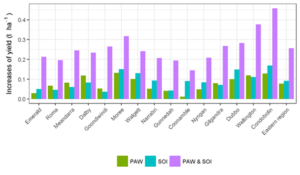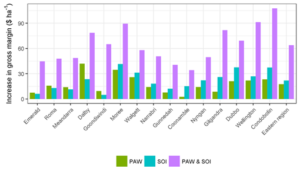The Value of Tactical Adaptation to El Niño–Southern Oscillation for East Australian Wheat
El Niño–Southern Oscillation strongly influences rainfall and temperature patterns in Eastern Australia, with major impacts on frost, heat, and drought stresses, and potential consequences for wheat production. Wheat phenology is a key factor to adapt to the risk of frost, heat, and drought stresses in the Australian wheatbelt.
Zheng et al 2018 explored broad and specific options to adapt wheat cropping systems to El Niño–Southern Oscillation in Eastern Australia. More specifically, they investigated the value of adaptation options to the Southern Oscillation Index (SOI) phases ahead of the season (i.e., April forecast), when local wheat producers make their most crucial management decisions.
Crop model simulations were performed with APSIM for commercially-grown wheat varieties, as well as for virtual genotypes representing possible combinations of phenology alleles that are currently present in the Australian wheat germplasm pool. Different adaptation strategies were tested at the site level, across Eastern Australia, for a wide range of sowing dates and nitrogen applications over long-term historical weather records (1900–2016).
The results highlight that a fixed adaptation system, with genotype maturities, sowing time, and nitrogen application adapted to each location would greatly increase wheat productivity compared to sowing a mid-maturity genotype, mid-season, using current practices for nitrogen applications. Tactical adaptation of both genotype and management to the different SOI phases and to different levels of initial Plant Available Water (‘PAW & SOI adaptation’) resulted in further yield improvement. Site long-term increases in yield and gross margin were up to 1.15 t/ha and AU$ 223.0/ha for fixed adaptation (0.78 t/ha and AU$ 153/ha on average across the whole region), and up to an extra 0.26 t/ha and AU$ 63.9/ha for tactical adaptation.
For the whole eastern region, these results correspond to an annual AU$ 440 M increase for the fixed adaptation, and an extra AU$ 188 M for the PAW & SOI tactical adaptation.
The benefits of PAW & SOI tactical adaptation could be useful for growers to adjust farm management practices according to pre-sowing seasonal conditions and the seasonal climate forecast.


Increase in simulated yield (A) and gross margin (B) for tactical adaptation options compared to the fixed adaptation in each studied site and the whole Eastern wheatbelt. The three tactical adaptation options correspond to optimise long-term yield for either (i) low/medium/high pre-sowing plant available water (PAW), (ii) each class of Southern Oscillation Index (SOI), or (iii) each combination of PAW group and SOI class.
